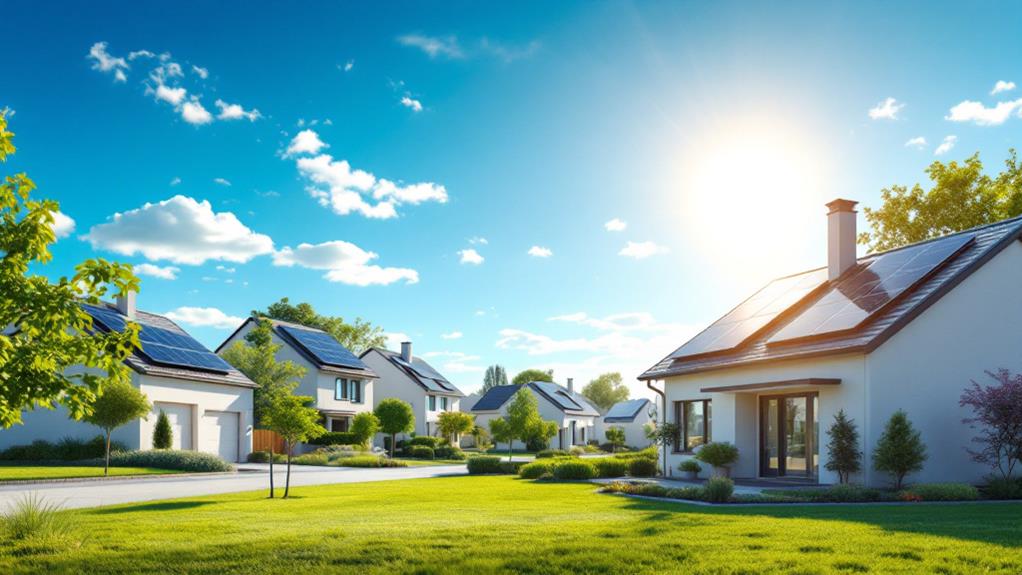
Best Solar Panels for Residential Use in 2025
In 2025, top-tier solar panels for residential use are dominated by high-efficiency models from brands like Maxeon and Canadian Solar, offering efficiencies up to 22.8%. Panasonic and REC provide low temperature coefficients and robust warranties of up to 25 years, ensuring longevity and reliability. Technological advancements such as PERC technology enhance energy generation by 6-12%, particularly important for limited space scenarios. Warranty lengths and low degradation rates, exemplified by SunPower Maxeon’s 0.25% annual rate, are key industry trends. Solar sustainability and lead-free practices are gaining momentum, aligning with environmental goals, offering more insights into this evolving landscape.
Key Takeaways
- Maxeon and Canadian Solar lead with 22.8% efficiency, providing top performance for residential solar panels.
- SunPower Maxeon 7DC offers a 40-year warranty and a 0.25% annual degradation rate, ensuring long-term reliability.
- REC panels offer up to 92% output retention after 25 years, highlighting durability and efficiency.
- Monocrystalline panels dominate with superior performance in low-light and urban settings.
- PERC technology enhances energy generation by 6-12%, optimizing solar panel efficiency.
Top Solar Panel Brands
When evaluating the top solar panel brands for residential use, efficiency, warranty, and market presence are key factors to contemplate. Maxeon, REC, Panasonic, Canadian Solar, and Qcells emerge as significant players in the market, each offering unique advantages that cater to different consumer preferences.
Brand comparisons reveal that Maxeon and Canadian Solar lead with an impressive 22.8% efficiency, appealing to homeowners prioritizing maximum energy yield.
REC and Panasonic follow closely behind, with efficiency ratings peaking at 22.3% and 22.2%, respectively. Panasonic’s low temperature coefficient of -0.26% makes it an attractive option for regions with variable climates, aligning with consumer preferences for stable performance across diverse environmental conditions.
REC’s robust warranty, ensuring up to 92% output after 25 years, attracts consumers seeking long-term reliability.
Qcells commands a significant market presence, capturing over 33% of the U.S. residential solar market. Its competitive efficiency, near 21%, coupled with a solid warranty, makes it a favored option for many.
This broad market acceptance highlights a trend where consumer preferences are increasingly influenced by brand reliability and widespread availability, alongside technical specifications. These insights are pivotal for homeowners exploring solar panel selections.
Efficiency and Performance
In the domain of residential solar panels, maximizing energy output is paramount, and this is largely achieved through advancements in high-efficiency technologies.
Panels such as the AIKO ABC Neostar and SunPower Maxeon exemplify industry-leading efficiency, offering significant energy returns even after years of service.
Moreover, innovations like PERC technology and enhanced performance in diverse weather conditions underscore the evolving capabilities of modern solar panels, ensuring reliable energy production across varied climates.
Maximizing Energy Output
To maximize energy output in residential solar installations, selecting panels with high efficiency ratings is essential. Solar energy efficiency determines how effectively panels convert sunlight into electricity, with options like the SunPower Maxeon 7DC 445W at 24.1% and AIKO ABC Neostar 3N54 495W at 24.8% setting industry benchmarks. These panels guarantee that homeowners receive maximum energy yields, critical for reducing energy costs and increasing sustainability.
Several factors influence maximizing energy output:
- Advanced Technologies: Incorporating features like PERC (Passivated Emitter and Rear Cell) technology can enhance energy generation by 6-12% compared to conventional panels. The Project Solar Evo Max Super Series 480W exemplifies this technological advancement.
- Ideal Installation: Properly aligning panels, minimizing shading, and making sure they face the sun directly are essential for ideal installation, greatly impacting energy production.
- Maintenance and Monitoring: Regular checks and maintenance of solar panel systems are fundamental to identify and address performance issues promptly, guaranteeing sustained energy efficiency.
The annual degradation rate also plays a role, with high-efficiency panels like the SunPower Maxeon exhibiting a low rate of 0.25%, assuring long-term performance.
High-Efficiency Technologies
Although the solar industry continually evolves, high-efficiency technologies remain at the forefront, driving exceptional performance in residential applications. High efficiency innovations like the SunPower Maxeon 7DC 445W and Aiko ABC Neostar 3N54 495W exemplify solar technology advancements, achieving efficiencies of up to 24.1% and 24.8% respectively. These panels maximize energy production, even in constrained spaces, making them ideal for urban settings with limited roof area.
Monocrystalline solar panels continue to dominate due to their superior efficiency and performance in low-light conditions compared to polycrystalline variants. This is essential for optimizing energy harvest throughout varied daylight hours. Leading brands such as REC and Canadian Solar offer competitive efficiencies ranging from 20.3% to 22.8%, ensuring robust performance in the residential sector.
| Panel Model | Efficiency (%) |
|---|---|
| SunPower Maxeon 7DC | 24.1 |
| Aiko ABC Neostar | 24.8 |
| REC | 20.3 – 22.8 |
| Canadian Solar | 20.3 – 22.8 |
| Monocrystalline | Superior |
Analyzing temperature coefficients, panels with lower values perform better in high-heat environments, further enhancing energy output. As solar technology advancements continue, these high-efficiency technologies set new benchmarks for reliability and performance in residential solar solutions.
Performance in Various Conditions
Some solar panels excel in diverse conditions, essential for optimizing residential energy production. The SunPower Maxeon 7DC 445W, with its efficiency rating of 24.1%, demonstrates robust weather adaptability, making it a prime choice for homes facing fluctuating weather patterns.
Additionally, the Aiko ABC Neostar 3N54 495W leads the industry with a remarkable 24.8% efficiency, ensuring high performance metrics even under suboptimal lighting, thereby maximizing energy yield across varied conditions.
Panels integrating advanced technologies, such as PERC, further enhance adaptability. The Project Solar UK Evo Super Max Series 480W, for instance, increases energy production by 6-12% during peak sunlight hours compared to traditional panels, showcasing significant gains in performance metrics.
Meanwhile, the JA Solar JAM72S30 LR 585W, with a 22.1% efficiency rating, is specifically designed for low-light scenarios, proving effective in regions with inconsistent sunlight exposure.
- SunPower Maxeon 7DC 445W: High efficiency and weather adaptability
- Aiko ABC Neostar 3N54 495W: Superior performance in suboptimal conditions
- JA Solar JAM72S30 LR 585W: Reliable in low-light environments
Suntech Ultra V Pro Mini 515Wp rounds out the selection, with its 23.2% efficiency tailored for harsh climates, ensuring consistent performance across diverse environmental conditions.
Durability and Warranty
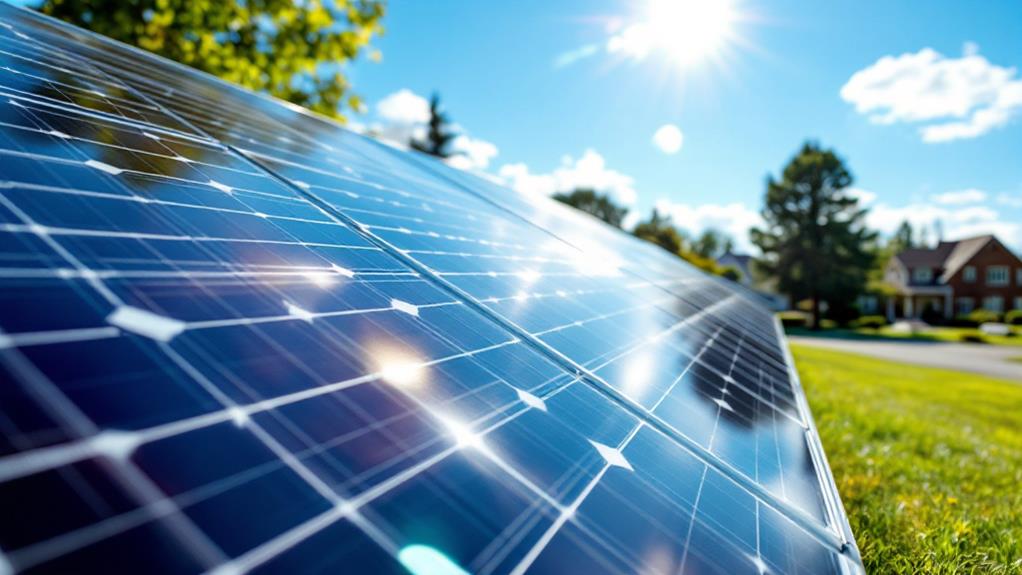
In evaluating the best solar panels for residential use, the importance of durability and robust warranty offerings cannot be overstated, as they provide assurance of long-term investment protection.
Panels such as the SunPower Maxeon 7DC and Project Solar Evo Max Super Series set industry benchmarks with extended warranties and impressive degradation rates, highlighting the significance of material quality in sustaining performance.
As industry trends move towards longer warranty periods and lower degradation rates, consumers are positioned to benefit from enhanced reliability and efficiency over the lifespan of their solar installations.
Longevity and Material Quality
How do you guarantee your investment in solar technology stands the test of time? A critical analysis of longevity and material quality reveals that the durability of solar panels is inherently linked to both the materials used and the engineering behind their construction.
Material durability is a prime factor; top-tier panels often employ tempered glass and robust frame structures to withstand environmental stressors. Such construction choices ascertain that panels like the SunPower Maxeon 7DC 445W, with its remarkable 0.25% annual degradation rate, retain efficiency over decades.
Longevity factors further emphasize technological advancements and meticulous manufacturing processes. For instance, Panasonic’s panels, achieving up to 22.2% efficiency, exemplify how advanced design contributes to long-term performance.
The confidence of manufacturers like REC and JA Solar, offering warranties exceeding 25 years, underscores industry trends towards enhancing panel resilience and reliability.
- Resilient materials: Tempered glass and sturdy frames protect against external elements.
- Low degradation rates: SunPower Maxeon panels maintain efficiency with minimal performance loss.
- High-efficiency designs: Panasonic panels lead with innovative construction, ascertaining sustained energy output.
These elements collectively ascertain that solar panels not only meet but exceed longevity expectations, securing your investment for the future.
Warranty Coverage Details
Evaluating warranty coverage is essential when evaluating the durability and reliability of residential solar panels. In 2024, a robust warranty can greatly influence consumer decisions, serving as an indication of a manufacturer’s confidence in their product’s longevity.
A warranty comparison reveals stark contrasts among leading brands. SunPower’s Maxeon 7DC 445W panel leads with an impressive 40-year warranty, showcasing a strong commitment to durability with a minimal performance degradation rate of 0.25% annually. This extended coverage underscores their assurance of long-term performance.
Project Solar UK’s Evo Super Max Series sets a high industry benchmark with lifetime warranties on both product and performance. This thorough coverage assures homeowners of consistent reliability throughout the panels’ operational life.
Aiko’s ABC Neostar 3N54 panels offer a 15-year product warranty, complemented by a performance guarantee maintaining 89% capacity after 25 years, highlighting a balanced approach to warranty and durability.
JA Solar and Suntech provide 12-year product warranties, with performance guarantees of 95% capacity retention after 25 years. These warranties reflect confidence in their panels’ durability across various weather conditions, reinforcing trust in their performance guarantees.
Such warranty comparisons reveal industry trends toward extended assurances, enhancing consumer confidence.
Degradation Rate Considerations
Warranty coverage details often highlight the manufacturer’s confidence in their solar panel’s longevity, but understanding the degradation rate offers a deeper insight into the panel’s durability over time.
Degradation metrics are essential in evaluating the long-term efficiency of solar panels. A lower degradation rate suggests that a solar panel will retain a greater percentage of its original output capacity over the years. For instance, the SunPower Maxeon 7DC exhibits a remarkably low degradation rate of 0.25% per year, underscoring its robust design and advanced material use.
- SunPower Maxeon 7DC: Achieves superior longevity with a 0.25% annual degradation rate, ensuring high efficiency over decades.
- Aiko ABC Neostar: Maintains approximately 89% capacity after decades, backed by a 15-year warranty, demonstrating long-term performance reliability.
- JA Solar: Offers a 0.55% yearly degradation, balancing efficiency retention with cost-effectiveness.
Industry trends indicate that modern solar panels are engineered to last between 30 to 40 years, with technological advancements minimizing degradation.
Most warranties guarantee 85-92% production after 25 years, with manufacturers like Maxeon and Panasonic leading in performance guarantees.
Hence, understanding degradation metrics is vital for consumers prioritizing long-term efficiency and investment value.
Customer Satisfaction
In evaluating customer satisfaction for residential solar panels, several models stand out due to their impressive ratings and feedback. The Project Solar UK Evo Super Max Series 480W leads with a 97% satisfaction rating, underscoring positive customer feedback on performance and high owner recommendation. Its success is attributed to seamless installation experiences and consistent energy output.
Following closely, the AIKO ABC Neostar 3N54 495W achieves a satisfaction rate of 96%, reflecting its reliability and adaptability across various environmental conditions. This model’s robust performance is often highlighted in customer reviews.
The REC Alpha Pure RX Series 470W, with a satisfaction score of 7.3, is commended for its blend of efficiency and positive installation experiences. Customers appreciate its balance of technology and ease of setup.
Meanwhile, the Jinko Solar Tiger Neo 72HL4-(V) 605W, scoring 7.1, is favored for its affordability and decent efficiency, appealing to budget-conscious consumers.
Contrastingly, the SunPower Maxeon 7DC 445W, despite its noted durability and extensive warranty, receives a moderate customer satisfaction score of 6.4, with feedback indicating potential improvements in customer service.
These insights provide a thorough overview of customer satisfaction in the solar panel industry.
Sustainability Factors
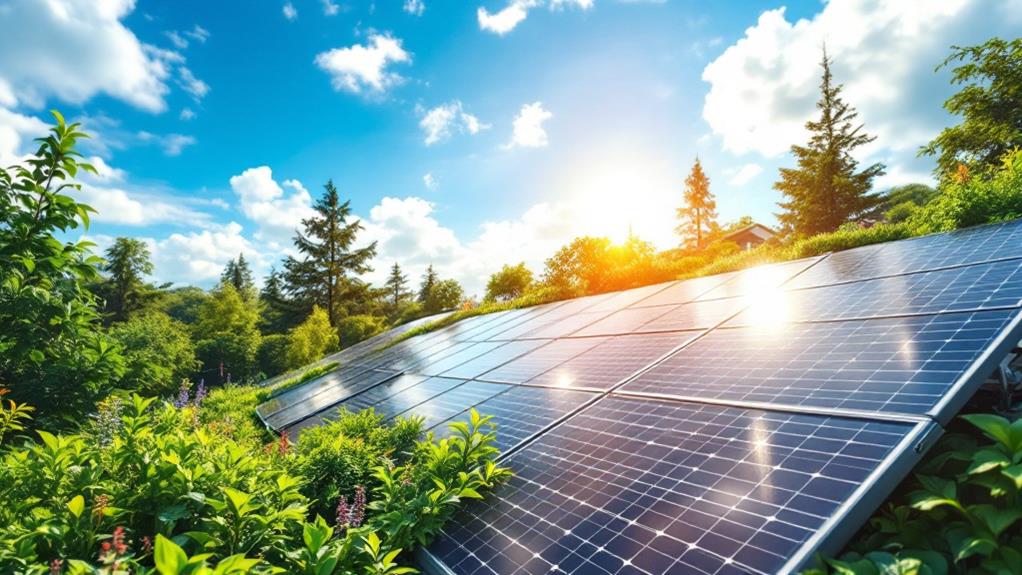
The solar industry is increasingly focusing on sustainability factors, with significant advancements in lead-free production practices and the incorporation of recycled materials.
Panels like the SunPower Maxeon 7DC 445W exemplify these trends, achieving high sustainability scores by eliminating toxic substances and utilizing eco-friendly components.
This shift not only mitigates environmental impact but also aligns with growing consumer demand for more sustainable energy solutions.
Lead-Free Production Practices
As the solar industry increasingly prioritizes sustainability, lead-free production practices have emerged as a pivotal focus for manufacturers seeking to minimize environmental impact. This change is particularly illustrated by companies like SunPower and REC, which have adopted lead-free methodologies to gain a competitive edge while adhering to global regulations.
The lead-free advantages are significant, primarily in reducing environmental impact and aligning with initiatives focused on eliminating toxic materials.
Lead-free solar panels utilize alternative materials such as tin and silver for soldering, which offers several benefits:
- Enhanced Safety: By substituting lead with safer materials, manufacturers mitigate health risks associated with lead exposure during production and disposal.
- Improved Recyclability: Tin and silver increase the ease of recycling solar panels at the end of their life cycle, promoting a circular economy approach.
- Reduced Carbon Footprint: Shifting to lead-free production decreases harmful emissions, thereby minimizing the carbon footprint associated with traditional lead processing.
The industry trend towards lead-free practices is further propelled by certification programs like IEC 61215, which emphasize sustainability in material selection.
Consequently, manufacturers are compelled to innovate in order to meet these evolving environmental standards, positioning lead-free solar panels as a benchmark for sustainable energy solutions.
Use of Recycled Materials
Stepping up sustainability efforts, many solar panel manufacturers are integrating recycled materials into their production processes, considerably reducing waste and environmental impact. This shift is essential as it not only reduces the carbon footprint associated with panel manufacturing but also supports the circular economy—a model where resources are reused and recycled, minimizing waste.
Companies like SunPower are leading the charge by utilizing recycled silicon, a significant step in promoting eco-friendly practices. This approach aligns with broader industry trends focused on resource efficiency and environmental responsibility.
Current research highlights the potential of recycling old solar panels to recover valuable materials such as silicon, silver, and aluminum. These materials can be reintegrated into new solar panel production, further advancing the circular economy within the renewable energy sector.
The adoption of recycled materials is gaining traction, driven by both environmental imperatives and consumer demand for sustainable products. Eco-label certifications have become more prevalent, serving as a confirmation of the industry’s commitment to these practices.
Cost and Savings
Frequently, homeowners evaluating solar energy options are met with the essential consideration of cost and savings. The financial landscape of solar installations is nuanced, with the average U.S. cost ranging from $3 to $4 per watt. Smaller systems often incur a higher cost per watt, yet the potential savings are significant. Installation incentives such as federal solar tax credits, which decrease costs by up to 30%, are crucial in enhancing savings potential.
Key cost and savings insights include:
- Installation incentives: Federal tax credits and local rebates can substantially lower initial outlay.
- Long term benefits: Reduced electricity bills and increased property value offer compelling financial returns.
- Payback period: A typical 5 kW system, costing approximately $14,000, can pay for itself within a decade, contingent on local energy prices and incentives.
The long-term benefits of solar installations extend beyond immediate financial relief. As energy prices rise, homeowners can expect substantial savings over the system’s lifespan, which can amount to thousands of dollars.
Additionally, solar systems enhance property value, making homes more attractive in the real estate market. This combination of immediate and long-term financial advantages positions solar energy as a prudent investment for residential properties.
SunPower Maxeon Overview
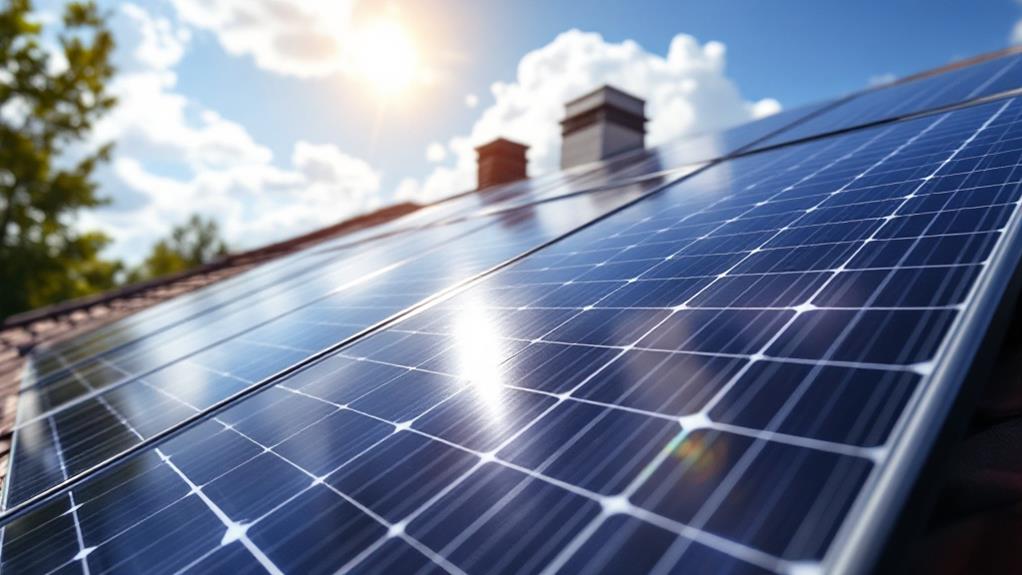
In the quest for maximizing savings and enhancing property values through solar energy, selecting the right solar panel is a critical decision for homeowners. SunPower’s Maxeon technology emerges as a frontrunner in this arena, setting industry standards with its Maxeon 7DC 445W panels. With an efficiency rating of 24.1%, these panels are among the highest-performing options available for residential sectors. This superior efficiency, coupled with an exceptionally low annual degradation rate of 0.25%, guarantees that the panels sustain peak energy output for over four decades.
| Feature | Specification | Benefit |
|---|---|---|
| Efficiency | 24.1% | Maximizes energy production |
| Degradation Rate | 0.25% annually | Long-term energy stability |
| Warranty | 40 years | Peace of mind |
The Maxeon panels also excel in panel aesthetics and installation flexibility, thanks to their compact and lightweight design. This makes them ideal for roofs with spatial constraints, enhancing their appeal in urban settings. Additionally, their perfect sustainability score of 10.0 highlights SunPower’s commitment to eco-friendly production, aligning with growing industry trends towards sustainable energy solutions. Altogether, SunPower Maxeon panels represent a blend of cutting-edge technology and environmental stewardship.
Project Solar Evo Max Details
As a formidable contender in the domain of residential solar power, the Project Solar Evo Max Super Series 480W panels blend cutting-edge technology with industry-leading durability.
The Evo Max technology leverages advanced PERC (Passivated Emitter and Rear Cell) mechanisms to enhance energy production by 6-12%, setting a new benchmark in efficiency. This innovation guarantees homeowners benefit from optimized performance, even in less-than-ideal sunlight scenarios, demonstrating a clear installation advantage for varied residential environments.
Project Solar’s commitment to quality is evident in its industry-leading lifetime warranties. This assurance provides robust support, fostering confidence among homeowners and contributing to a remarkable 97% customer satisfaction rate.
Key features include:
- Durability: Engineered to withstand harsh weather conditions, the Evo Max series maximizes longevity and reliability.
- Versatility: Panels are optimized for low light conditions, making them effective across diverse settings.
- Reputation: High customer satisfaction with a significant percentage of owners recommending them.
The Evo Max series not only exemplifies technological advancement but also aligns with industry trends toward sustainable and reliable energy solutions.
Such attributes position Project Solar Evo Max as a top choice for forward-thinking homeowners.
AIKO ABC Neostar Insights
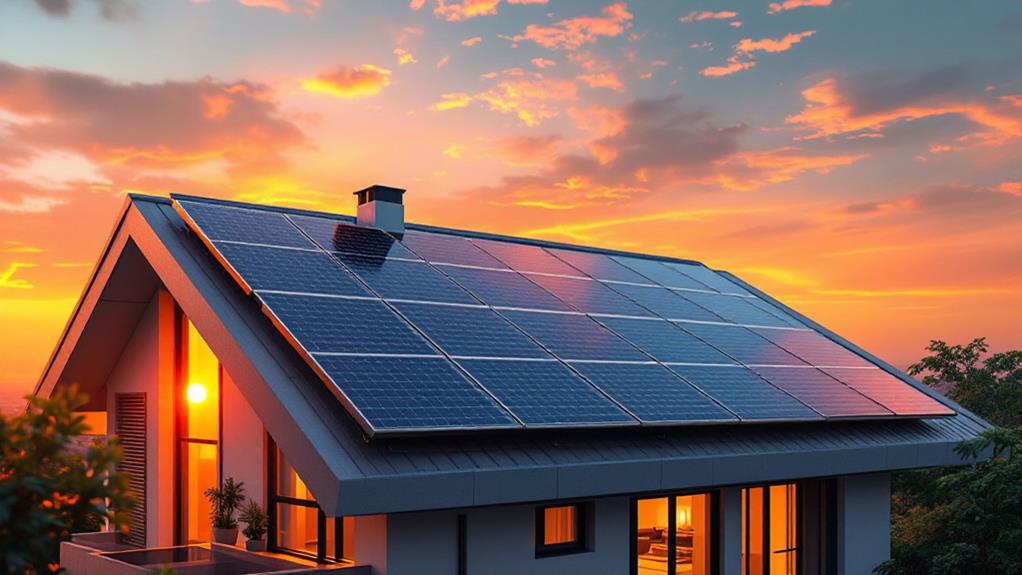
With a remarkable efficiency rating of 24.8%, the AIKO ABC Neostar 3N54 495W solar panel stands out as a top-tier option for residential solar solutions in 2025. This panel’s ability to maintain approximately 89% of its capacity after decades of use underscores its long-term energy production reliability. Its integration of advanced PERC technology enhances energy yield, particularly under low-light conditions, positioning it as an ideal choice for diverse climates.
| Feature | Details |
|---|---|
| Efficiency | 24.8% |
| Capacity Retention | 89% over decades |
| Product Warranty | 15 years |
The AIKO ABC Neostar benefits extend beyond performance metrics, offering a robust 15-year product warranty, which provides homeowners with assurance in their solar investment. This warranty, coupled with a 96% customer recommendation rate, reflects high satisfaction and confidence in the product.
In terms of aiko abc neostar installation, its design supports ease of integration into existing residential setups, accommodating varied roof types and spaces. This adaptability simplifies the installation process, reducing both time and labor costs. As industry trends continue to favor high-efficiency and reliable solar solutions, the AIKO ABC Neostar remains a commendable choice for homeowners seeking sustainable energy options.
Perlight PLM-435 Features
Emphasizing durability and efficiency, the Perlight PLM-435 DH8N solar panel emerges as a versatile choice for residential energy solutions. With a substantial power output of 435W, this panel is well-suited to meet diverse household energy demands.
Its durability rating of 8.4 underscores its robust construction, engineered to endure varying environmental conditions. This guarantees reliability and longevity, vital factors for residential installations. A performance rating of 7.8 highlights the panel’s proficiency in converting sunlight into energy, enhancing household energy efficiency.
For those considering installation, it is advisable to position the panels to maximize sunlight exposure, ideally on a south-facing roof with minimal shading. Regular maintenance is essential to sustain efficiency; cleaning the panels periodically to remove dust and debris will enhance performance.
Furthermore, inspecting connections and mounting structures guarantees structural integrity and safety.
Key features of the Perlight PLM-435 DH8N include:
- Competitive pricing: Offers a balanced performance-to-cost ratio.
- Moderate customer satisfaction: A score of 6.8 reflects its reliability and performance.
- Installation tips and maintenance guidelines: Essential for achieving best results and longevity.
The Perlight PLM-435 remains an appealing option for budget-conscious homeowners, aligning with ongoing industry trends towards cost-effective solar solutions.
Sourcing Solar Panels
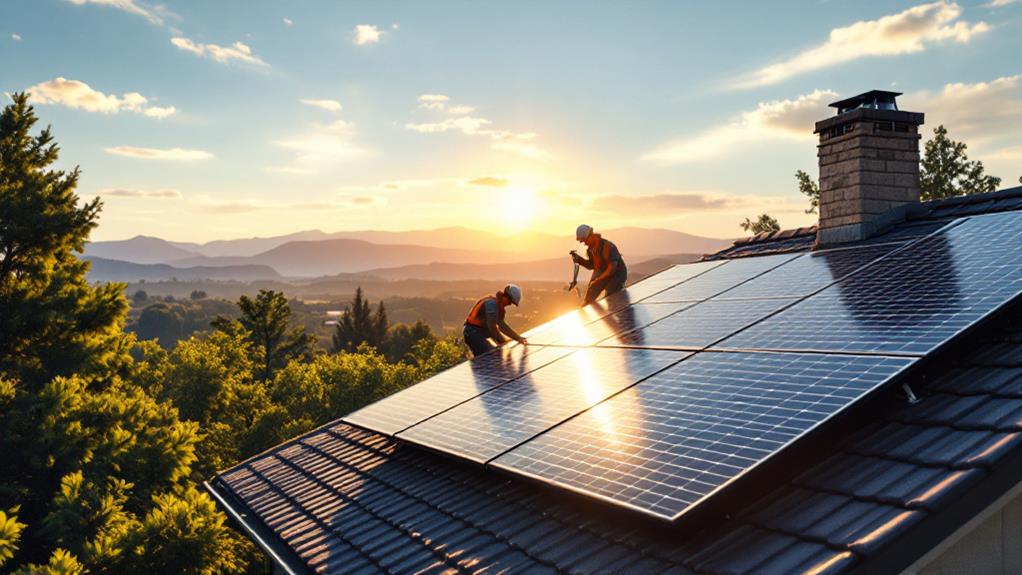
Maneuvering the landscape of solar panel procurement requires a strategic approach, given the extensive array of over 2,000 providers in the UK market. This diversity necessitates a meticulous evaluation of solar panel financing options, installation tips, and regulatory compliance. Engaging in free quote comparison forms is prudent to discern efficiency, specifications, and warranties. Understanding local incentives, such as grants and tax credits, is essential as they can substantially alleviate installation costs.
| Key Aspect | Consideration |
|---|---|
| Solar Panel Financing | Explore diverse options for budgets |
| Installation Tips | Prioritize professional services |
| Regulatory Compliance | Guarantee adherence to local laws |
| Local Incentives | Investigate available grants |
| Energy Efficiency | Evaluate panel performance metrics |
Analyzing aerial views of your property is recommended to identify ideal system configurations, thereby enhancing energy efficiency. Selecting the right contractor is significant; consider those with proven track records to guarantee adherence to installation timelines and system maintenance protocols. This strategic selection can mitigate potential delays and guarantee a seamless integration process. Thorough research into the contractor’s credentials and customer feedback is indispensable. By addressing these technical and financial dimensions, homeowners can make informed decisions that align with both their energy needs and fiscal capabilities.
Frequently Asked Questions
What Is the New Solar Panel Technology for 2025?
The new solar panel technology for 2024 emphasizes perovskite solar advancements and bifacial technology. These developments enhance efficiency, cost-effectiveness, and energy capture capabilities, reflecting significant industry trends and technological progress in renewable energy solutions.
What Is the Highest Rated Solar Panel?
The SunPower Maxeon 7DC 445W holds the highest efficiency ratings at 24.1% with low annual degradation, while offering competitive installation costs. Industry trends emphasize efficiency and longevity, critical factors in evaluating residential solar panel investments.
What Is the Best Solar Panel for UK Weather?
Considering the UK’s often overcast conditions, selecting a solar panel with high efficiency and weather resilience is essential. SunPower Maxeon 7DC, with 24.1% efficiency, excels in low-light settings, aligning with current industry trends for peak performance.
Which Company’s Solar Panel Is Best for Home?
When evaluating the ideal solar panel for residential use, consider Maxeon’s superior solar panel efficiency and long-term cost-effectiveness. Maxeon’s low degradation rate and extensive warranty greatly minimize installation costs over time, aligning with current industry trends towards sustainable investment.
Conclusion
The analysis of solar panels for residential use in 2025 highlights key brands excelling in efficiency, performance, and durability. Project Solar Evo Max, AIKO ABC Neostar, and Perlight PLM-435 emerge as leaders, offering innovative features and robust warranties. Customer satisfaction and sustainability factors further influence purchasing decisions, underscoring the growing trend toward eco-friendly energy solutions. As sourcing strategies evolve, these advancements set benchmarks for the industry, facilitating informed choices in adopting solar technology.


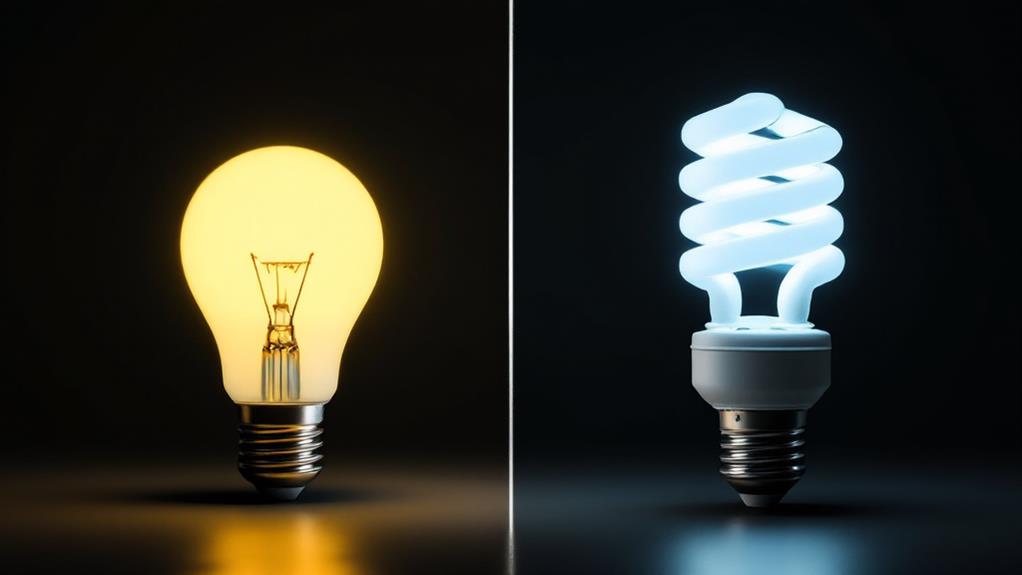
Leave a Reply